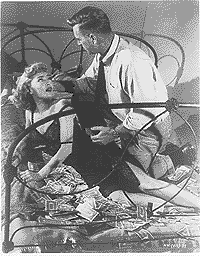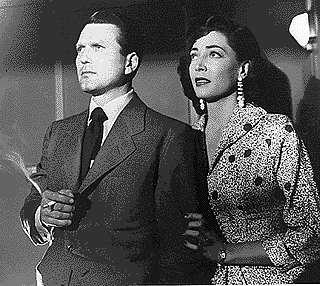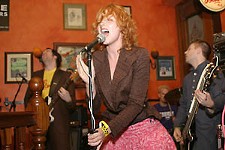Marie Windsor
Tales of Noir and B Movies
By Jerry Renshaw, Fri., Oct. 31, 1997
|
|
Windsor never seemed to get the kind of career breaks that other Hollywood stars did. She won the Look magazine award for Best Supporting Actress in 1952 for her work in The Narrow Margin, but as luck would have it, that was the first year that the magazine did not throw a splashy Hollywood-style party to hand out the awards. Instead, the magazine's West Coast editor called Windsor at home and said, "You know, I drive by your house on my way to work every day. Do you think it'd be okay if I just dropped it off sometime?" "That," said Windsor, "was just about par for the course."
Now in her seventies, Marie Windsor lives comfortably in Beverly Hills with her husband, realtor Jack Hupp, and her dog Tizzy. A veteran of over 70 films, as well as countless TV shows such as Simon and Simon, Murder She Wrote, Fantasy Island, and Tales From the Darkside, she's a very gracious and pleasant lady whose name might not always be recognized, but whose face surely is.
Austin Chronicle: According to The Film Encyclopedia, before you started acting you were a telephone operator?
Marie Windsor: Yes, that was in Utah.
AC: And a Vargas model?
MW: Yes, that was after I was at MGM, they called a couple of us starlets to pose.
AC: And you were a Miss Utah at one time?
MW: Well, that was kind of a peculiar thing, I've got to strike that out somehow. Actually in those days, because of the Mormons, they didn't have a Miss Utah contest. They had a man named Gus Bachman who was head of the chamber of commerce, and they had instead Miss Covered Wagon, and they had an opportunity, somebody needed a Miss Utah for some kind of a festivity and Mr. Bachman said, "Well, you're the nearest thing we've got, so go and represent us."
|
|
AC: What year would that have been?
MW: '39. I was Miss Covered Wagon Days.
AC: You studied under Ouspenskaya, is that right?
MW: Ouspenskaya, that was in Hollywood here.
AC: And you had some pretty extensive stage experience as well, right?
MW: Yes, well, I did a couple of little theater things here on the coast, and then I went to New York and did a lot of radio, and then I was narrator for The New York Times fashion show, which was a big event that ran for a week, which was all they intended, it ran at the 44th Street Theater. And then I replaced Karen Stevens in Follow the Girls on Broadway. That was a Gertrude Neeson show.
AC: I've seen The Narrow Margin so many times I almost know it by heart. It's not only one of my favorite films noir but one of my probably top 20 favorite films ever. That movie was done on a pretty tight budget and shooting schedule, is that right?
MW: Yes, I used to know how much it cost. It was very inexpensive. [The shooting schedule] was only 21 days. I think it cost something like $90,000 [laughs]. One interesting thing about The Narrow Margin is that Stanley Rubin, the producer, we've remained good friends over the years, he told me something I never heard of before, is that one of the most admired things about the movie is that there's no soundtrack. Stanley said that many people remarked that there was no musical score behind it, and they saved money by just making the sound of the train in the background. Both that and The Killing were released with bigger pictures and those little pictures got the best reviews and just keep being shown at art theaters all over the country. Most of my fan mail, people remark about those two pictures.
AC: Richard Fleischer went on to direct some pretty well-respected stuff in later years. What was he like to work with then, he was still a fairly young director at that time, wasn't he?
MW: Well, he was a darling man, I think that was what got him out of the B pictures. I wished he had remembered me when he jumped to the As, but I never worked for him again. So, we're good friends, we see each other and he's always been very fond of me, but I guess to him I'm still a B actress [pause].
AC: Did you ever feel typecast in the femme fatale, dragon lady kind of roles?
MW: Yeah, I was, and I got tired of it, and I made a terrible mistake. I thought maybe it was because of my nose, so I had the bump taken off my nose, and it was a dreadful mistake. I thought maybe if I didn't have such a harsh nose that I wouldn't be cast as a villain... a director I was working with commented on, "Well, you have to turn this way, because of the shadow of your nose we're trying to avoid," which got me to thinking. Now I wish he'd never said that to me!
AC: Charles McGraw always seemed to play a tough guy. Was he actually a pretty tough guy in real life?
MW: Oh no, he was a sweetheart. He had an alcohol problem, but he didn't drink on the set on our pictures that I recall. He was a sweet man, he had a lovely Chinese wife and a gorgeous daughter who married into some great wealth here in Los Angeles. But you know how he died.... He fell in the shower and didn't have safety glass, and he bled to death before the doctors could get to him.
AC: Ooh, that's an awful way to go [long pause]. What about Sterling Hayden? I know he usually played the tough guy roles too. Sterling Hayden was a bona fide WWII hero, wasn't he, a tough guy in real life like, say, Lawrence Tierney was?
MW: Yup [but] nothing like the Tierneys! No, no, no. He was a gentleman, soft-spoken, a very sweet man, a sort of almost tender fellow. I never saw another side to him.
AC: The Killing has such a great screenplay and plot; I've always especially liked the way that movie was structured chronologically, it kind of seems like a precursor to Pulp Fiction in that way. What was Stanley Kubrick like to work with?
MW: There was another very quiet man, I heard later he got a big voice, like when he was working with Kirk Douglas. When I worked with him he was very soft-spoken, and he was the kind of director that never directed you in front of the crew or other actors. If he had any suggestions to me he said, "Marie, come over here for a minute, will you?" and then he'd make a suggestion. He was very fast; at the time he was married to an artist and he had her draw every scene with the actors and where the camera was. When I went in to show him some wardrobe for the show, I saw his walls were covered with these drawings in sequence of how he'd shoot the picture.
AC: You worked with Elisha Cook, Jr. in that film as well as a couple of others. Were you friends offscreen as well?
MW: We became friends when I first worked with him, and I can't remember what that was, but I do remember that when we worked on The Killing we were both glad, because our paths had crossed several times through the years. Then when I did Salem's Lot, he was so sweet, we hadn't seen each other in 20 years. He came on the set with a lovely box with a huge orchid in it, and said "It's so great to work with you again," something like that.
AC: You and Elisha Cook worked together again on Salem's Lot, directed by Tobe Hooper. Do you have any specific recollections about Tobe?
MW: I grew very fond of Tobe, I can't remember how I got to know him first, but anyway, he was always crazy about me and acted like it, so naturally I liked him. I was so fond of him that I tried to fix him up with a girlfriend of mine, but it didn't work out, but that's neither here nor there. He certainly is a talented director, but I always wondered why he always leaned toward the macabre and grotesque. He's from Texas, isn't he?
AC: Yeah, he's done a lot of work around here. Mind if I switch gears a little here? I'm going to ask you about a film that you may be a bit reticent about discussing, which I could understand.
MW: What's that?
AC: Cat Women on the Moon.
MW: Oh god, I knew you were gonna say that!
AC: Yeah, I figured you could probably see that one coming. Y'all did a great job of keeping a game face all the way through it, and I'm sure it had to have seemed a little ridiculous to you at the time. Didn't they chunk a giant spider on top of you in that movie?
MW: Oh yeah, and they had a terrible time getting it mechanically to work! I loved that spider, I loved all the special effects things. That picture was a Lippert picture, and they had a certain schedule, Lippert was known to do that, he did that on another picture of mine, what was it? Darn it, with Lloyd Bridges, something about Custer! Anyway, on Cat Women on the Moon we ran over schedule, so they just tore up the other pages, so if it doesn't make sense, that's one of the reasons why. But anyway, the chairs, we went up in space in chairs that had roller things on them! And a lot of little things like that were so ridiculous! But it sure became a film buff's favorite.
AC: My wife and I rented Swamp Women awhile back, and I know that you think it's such a stinker, but we thoroughly enjoyed it. I know Roger Corman had the reputation for turning stuff out pretty fast. Do you recall how long that one took?
MW: It was two weeks. My agent screwed up my calendar for work, and I had The Killing to do, and Kubrick was willing enough to postpone my starting date, and Corman was nice enough to let me go home a couple of days earlier, so I did get to do The Killing. Otherwise I would have missed out on one of the best parts of my life!
AC: From everything I've heard, Corman sounds like a very interesting guy.
MW: He's a very nice fellow, he just likes to make cheap pictures!
AC: Well, a lot of the stuff that he made that was so cheap is very well-respected to this day. I know that he can get the performance he wants out of people without having to push them too hard.
MW: Well, he's a pleasant, nice director. I never saw him lose his temper about anything, and certainly on that job and plenty of others he had good reason to.
AC: You gals certainly did a lot of rasslin' around in that movie.
MW: Well, it was a tough location. Jil Jarman and I, we had to pull the boat full of people through these lily patches, wading through this terribly thick mud. The mud, I don't know what it is in Louisiana, but the water was about two feet deep and the mud underneath it was about three feet deep, so it was certainly tough to walk in it. Anyway, Jil stepped on something and cut her foot. They got her out of the lily patch, and by the way it was all filmed on Huey Long's estate. She had stepped on something, and it turned out to be a safety deposit box from a bank, and we all wondered why Governor Long had dumped it there! But I guess I got you off track here.
AC: Let's talk about 1947's Force of Evil. You worked with John Garfield in that, right?
MW: Yup. His love interest was played by Bea, oh, I forget her name, everyone thought she was a very disagreeable lady. I didn't find her so, but I didn't do any scenes with her. Anyway, she was the love interest and I was a married woman on the make for him. To work with him was a delight; he's one of those giving actors, and he didn't seem to mind at all that I had to bend my knees to work with him, or that he stood on a box. He showed me how to bend my knees more as I got closer to him in a shot.
AC: I hope this is something that won't be a sensitive topic for you. When your career was really hitting its stride, the House Un-American Activities Committee was cutting a pretty broad swath through Hollywood. Is this something that affected your career at all?
MW: I didn't really let it bother me, though I was quite aware it was going on. I'm a conservative, so I wasn't really getting involved in anything. I really believed that people who were not faithful to our government should in some way be controlled, and as I say, I didn't really get involved in doing anything about it. As a matter of fact, a picture I did in New Mexico, called The Tall Texan, with Lloyd Bridges, Luther Adler, and Lee J. Cobb, they had all been questioned by the Un-American Activities Committee, and I really didn't give it a second thought to work with them, because they were all my friends and I liked them very much. Later on, Lee J. Cobb brought it up that he had nothing to do with it but someone had incorrectly implicated him. I knew Frank Capra from my trip to India, so I asked Capra on his behalf to see if he could help him, and I got them together and that was it. That was as much as I got involved in any of that stuff.
AC: You played Napoleon's Josephine at one point too, didn't you?
MW: Yeah, with Dennis Hopper.
AC: And what film was that?
MW: Aaah, I don't remember. Oh, dear. If you'll hold on a second, I'll get a list of my pictures and tell you pretty fast [pause]. We did it at Warner Bros. My third favorite movie is Hellfire, by the way, with Wild Bill Elliott.
AC: Don't believe I've seen that one.
MW: Darn it. The Story of Mankind.
AC: And who directed that?
MW: Screenplay by Irwin Allen. And directed by him. 1957.
AC: You played Josephine, did Dennis Hopper play Napoleon? He was still pretty young then, wasn't he?
MW: Yeah, he was, it was before all the... excitement occurred about his career.
AC: Vincent Price was in that film as well; I have always heard that he was a very nice man, very cultured.
MW: Charming fellow, very warm-hearted, gracious gentleman. I did a talk show, I guess you'd call it, with Vincent, a pilot that didn't sell. Somebody's got a copy of that somewhere, I should send for it, just for fun.
AC: Among your contemporaries, who are some of your favorite performers?
MW: Well, one of my, uh, we became close friends, was Cesar Romero. I did a picture with him in India and we became very good friends. And, let's see, well, I seemed to like everybody I worked with, so I don't know how to tell you. Howard Koch is an old friend of mine, the father, both he and his wife. I did a picture with him in Utah in 1957.
AC: What would you count among some of your favorite films?
MW: The Killing, The Narrow Margin, and Hellfire!
AC: (laughs) Uh, could you be a little broader than that?
MW: It certainly wasn't Swamp Women; that's almost as bad as Cat Women was. Day of the Bad Men, I liked. Directed by Harry Keller, with Fred MacMurray, Joan Weldon, John Erickson.
AC: Is there other stuff in the noir or detective genre that you're particularly fond of? Like any of Edward Dmytryk's films, maybe?
MW: The Sniper, I thought that was a good film. Oh, another of my favorites was John Wayne, I made three movies with him.
AC: So you were well-acquainted with each other?
MW: Oh yeah.
AC: Among current performers who are some of your favorites, who do you think is showing a lot of promise?
MW: I'm crazy about the woman, the actress that's in The Thousand Acres, oh, I can't think of her name...
AC: Jessica Lange?
MW: Yeah, I think she's terrific, and also Meryl Streep. I really admire their talent.
AC: Well, they've certainly had pretty diverse careers in the last 20 years or so.
MW: Yes, they have.
Thank yous to Ed at CLI Talent, Marty Baumann at the Astounding B Monster e-zine, and Tim Stegall for making this interview possible.










